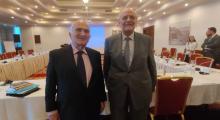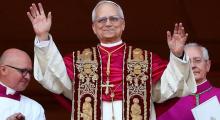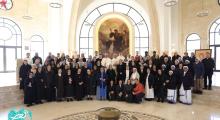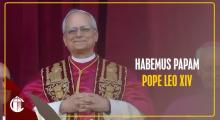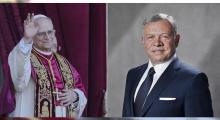Issued by the Catholic Center for Studies and Media - Jordan. Editor-in-chief Fr. Rif'at Bader - موقع أبونا abouna.org
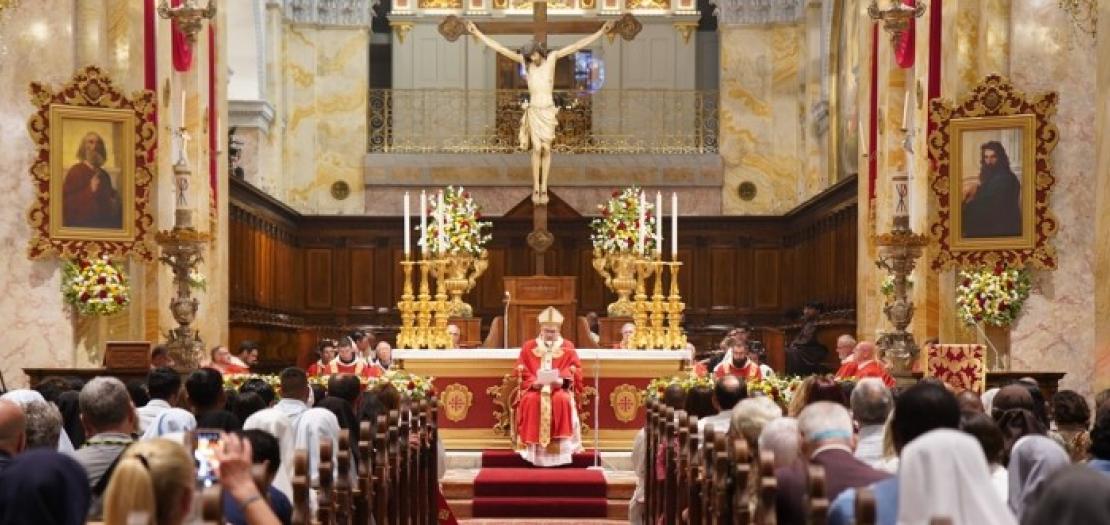
Following is the text of homily by Cardinal Pierbattista Pizzaballa, Latin Patriarch of Jerusalem: at the solemn Mass of Saints Peter and Paul and priestly ordination of the Franciscan Friars Br. Lorenzo Pagani and Br. Mark Vertido Palafox at the Church of St. Savior in Jerusalem on Friday, June 28, 2024:
Most Reverend Father Custos,
Dear Brothers and Sisters,
May the Lord give you peace!
It is beautiful to gather here in this church, just like every year, to celebrate together with the Custody the Solemnity of Saints Peter and Paul, a special solemnity for the whole Catholic Church, and to pray together with the new priests being ordained today, as well as for the life of the Church, for the Holy Father and all of us.
Although we hear it every year, and often more than once, today's Gospel passage continues in a way to disturbs us. Indeed, the question about Jesus has never ceased to trouble generations of believers and non-believers. Even after two thousand years, the question of Jesus' identity continues to engage those who seriously question life. Jesus never ceases to take us out of our comfort zone, especially us believers. And if we do not ask the question, if that question does not bother us, then perhaps we have some serious faith concerns.
In short, Jesus' question to his disciples, still to this day, continues to resonate in the hearts of many. For example, in any bookshop in the world, one can certainly find authors proposing new theories - sometimes interesting, sometimes bizarre - about Jesus, his identity, the Gospels, about the Church, which they claim would have understood or not understood who Jesus is, depending on the case.
After all, what we heard in the Gospel is still happening today. Some believe he was John the Baptist, for others Elijah or one of the prophets. In the conclusion of the last book of the OT, according to the Catholic Code of Canon Law, the prophet Malachi speaks of the prophet Elijah, who would turn “the heart of fathers to their sons, and the heart of sons to their fathers," (Mal. 3:24), and who would bring back righteous faith into the lives of the people. The legacy of the prophet Elijah, according to the evangelists, would return and be identified by John the Baptist, not surprisingly the first NT figure.
For many, Jesus was, in sum, God's special messenger, a new Elijah, a fascinating character who had the miraculous, but still remained within one's human understanding. God is something else; there was to be no mixing of planes. It is the temptation that cyclically always returns: to try to reduce the "Messiah, the Son of the living God" (Matt. 16:16) to a special messenger, a unique character, but only human. Nothing to do with the Kyrios, the Lord. No resurrection. It is no coincidence that in all the Gospels this passage is linked to the announcement of the death and resurrection, the Passover, where the Kyrios, will be manifested in all his humanity and all his divinity, with "the power of his resurrection" (Phil. 3:10), where the true identity of Jesus will be fully revealed.
Even today, we experience the temptation to think of Jesus as Elijah, or one of the prophets, someone we can in a sense possess, keep within the bounds of human reason, and who leaves us comfortable, ultimately, in our comfort zone. We think we do not need salvation, because we can save ourselves. We do not need a savior, at most we need a brilliant character who makes us think, but nothing else.
But you, dear brothers, have not left everything behind, you have not embraced the religious life just to go after some ordinary man, who lived here two thousand years ago, though fascinating. And you are not about to become priests, mediators, a place of meeting between that man and the world. You would be pitied if that were the case. You have left everything, your life has been changed, and you are instead about to become priests, the place of encounter, the presence and image of a living God, the One who brought salvation, which every man and the world needs.
For the world is marked by sin, and needs salvation, which is the first proclamation you are called to bear. By your life, when you break bread on the altar, when you give God's comfort and forgiveness, when you draw near to the wounds of the world to bring the balm of consolation, you make yourselves proclaimers of the power of Jesus' resurrection, and not messengers of a merely interesting man.
However, being Christ's image, also entails taking on his very sentiments (cf Phil 2:5), knowing him, and becoming familiar with him. An interesting priest expresses in his life, in his speeches, in his prayer, in his lifestyle, familiarity with the person of Jesus. On the other hand, a priest is not interesting, when he is occupied with everything, has his heart immersed in everything, but does not let that familiarity shine through. He is not useful when his identity as a priest of God is mixed up with the dynamics of the world. Certainly, the priest deals with the life of the world, but it does not belong to him. Familiarity with Jesus makes him close, but also somewhat different. If you are not different, if you do not bring a flavor of the things above into your life, what use is the priesthood to you, who cares to know you, if they do not see a different light in your eyes?
You do not get that far on your own, it is a gift: " For flesh and blood has not revealed this to you, but my heavenly Father" (Matt. 16:17). In your prayer life, which must be a constant appointment in your life as priests, you must always cultivate this friendship, attend to His word, let Him lead you, trusting completely in Him who gave His life for you. It is a gift that must be continually cultivated. Like all friendships, it needs to be attended to. You cannot remain friends with people you do not frequently visit. One is not a friend of Jesus if one does not constantly associate with him. One is not a solid priest, if one builds one's life on oneself alone, instead of relying on the Church.
This gift is not only personal. The Church is the place to cultivate this particular experience. You will not bind or loosen burdens from people's hearts by yourselves, but always in the name of the Church, led by the successor of Peter: "Upon this rock, I will build my Church" (Matthew 16:18). On this Church. Not on yourselves, on your idea of the Church, not on our passing whims, but on and in the Church.
Jesus entrusts the life of the Church and His desire for the salvation of every man to Peter. To the weak and impulsive Peter. He is the impetuous character who easily bursts onto the scene, the one who confesses Jesus as the Messiah of God; but also, the one who wishes to stop Him on His way to Jerusalem. Peter is the hesitant and fearful man, who does not dare to profess Jesus at the painful moment of the Passion, betraying Him. However, Peter is not frightened by his failure, he does not stand still and let his sin close his heart, but knows how to marvel, knows how to search, knows how to start again and indeed to run the race, even at the incredible announcement of the empty tomb.
You too will be tempted to surrender to weakness. We too, the Church of Jerusalem, experience the temptation to surrender to the tragic situation we are experiencing. Within this conflict, which is now part of the Church's identity, we too have the temptation to rely on a merely human messiah, like one of the prophets, to wield the sword, to keep our lives for ourselves, instead of giving them for the life of the world, in the Eucharist and life.
In the time of the dictatorship of sentiment, where authenticity is increasingly in danger of rhyming with subjectivity and truth with what thrills, faith cannot be reduced to an intimate sensation, or human or political action but must return to being a confident choice that orients and changes lives and is therefore also convincing. With Peter, we are called to step out of the narrowness of our ego or common opinions and open ourselves to the Thou greater than ourselves, the Thou of Christ who opens us to the We of the Church. And only the utterance of that Thou, amid the We of the Church, will restore our true identity: you are Peter! (Mt 16:18). And it will not be a rigid, closed, exclusionary identity, to be opposed to the identities of others, but it will be an identity received as a gift, purified by love in the form of the Cross, willing to transform itself into service of the other so that all may find themselves brothers.
Dear brothers,
Today the Church in Jerusalem is celebrating, because two new priests have joined the ranks of those who wish to make Christ's message their own, and become in our Church, bearers of salvation, proclaimers of a different way of being in the life of the world, of those who, without fear of betrayal and weakness, have experienced the joy of salvation in their own lives, of which they now firmly bear witness to.
May your life always be marked by this serene awareness.
Best wishes!


